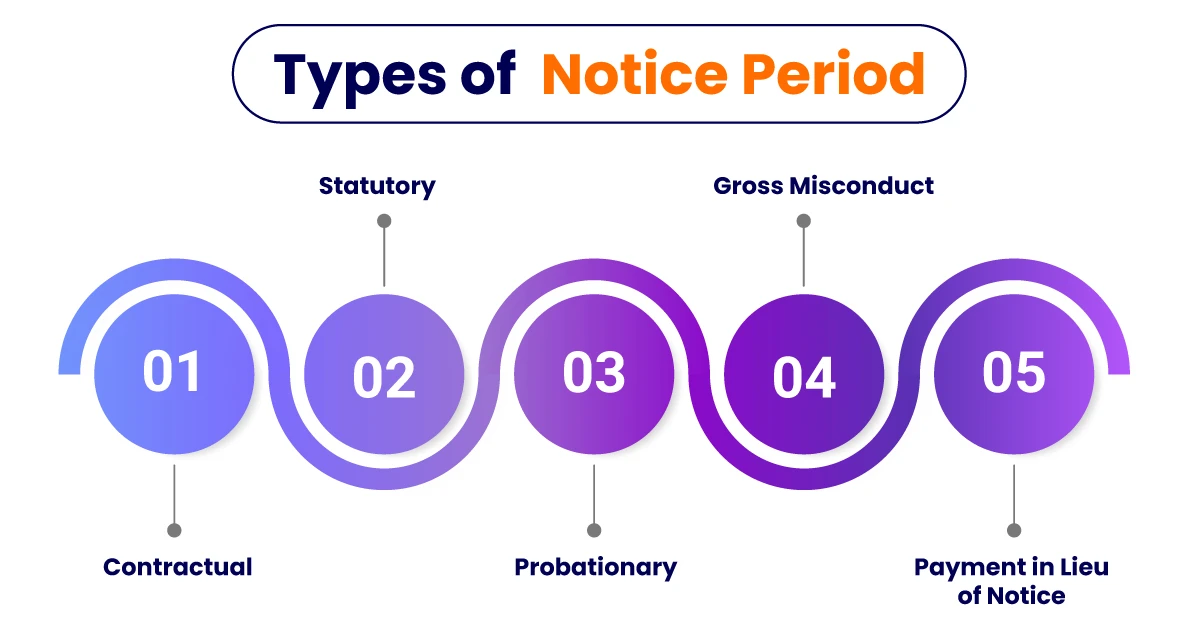Introduction to Notice Period
The notice period is to time duration between the day an employee resigns and the final day they work with the company.
Understanding notice periods is important for both the employer and the employee.
- Helps in a smooth transition
- Protects professional relationships
- Removes the sudden interruption in workflow
Employment contracts, company policies, and local labour laws support Notice periods. Among all types of notice periods, statutory notice periods stand out. They represent the legal minimum duration that must be given by the employee before leaving. This duration depends on how long the employee has worked for the organisation.
The main aim of a notice period is simple: give the employer enough time to find a replacement, while also allowing the employee to wrap up pending tasks responsibly.
Notice Period Fundamentals
1. What the Notice Period Refers To
The notice period refers to the period between the announcement of resignation or termination and the actual end of employment.
It allows both the employer and employee to prepare for the transition, ensuring minimal disruption to business operations and ongoing projects.
2. Contractual Notice Period
A contractual notice period is the agreed duration stated in the employment contract for both employee and employer. It is a mutual agreement between them and can vary depending on the company, industry, and role.
In India, contractual notice periods often require compliance with the statutory requirements according to the local labour laws. Contractual notice periods are usually longer than the statutory minimum notice period.
Employers and employees must adhere to the contractual notice period to avoid any disputes or legal issues.
Ensure compliance with contractual obligations and local labour laws by automating contract management with Bharat Payroll. Discover how our platform supports seamless notice period tracking. Request your demo now.
3. Notice Period Duration
The notice period duration depends on the employment contract, company policies, and local labour laws.
Duration- Notice period ranges from two weeks to three months in general. It can be less or more depending on the cases. In many countries, statutory notice periods state that the length of the notice period increases with the duration of the employee’s tenure. But in India, it is kept the same as in the joining letter.
The notice period duration is important for a smooth transition and completing any ongoing projects. Employers and employees must agree on the notice period duration to avoid any conflicts.
Bharat Payroll’s AI-powered payroll automation adapts to your company policies and statutory requirements. Explore our solutions today.
Types of Notice Periods

1. Statutory Notice Period
Statutory notice periods are the minimum set by law. They are not optional, and they differ based on how long the employee has worked with the organisation.
Take the United Kingdom, for instance. There, the statutory minimum notice period is one week for employees who have been with a company between one month and two years. In India, the Industrial Disputes Act mandates notice periods: usually between 30 and 90 days.
2. Probationary Notice Period
A probationary notice period comes into play during the probationary period or trial period of employment.
It is usually a shorter notice period and is designed to give both sides flexibility. Employers can quickly decide if the employee is a fit, and employees can also move on without being tied down for too long.
Probationary periods typically last less than a year, and notice expectations here are different from those in confirmed employment.
3. Contractual Notice Period
Contractual notice periods are the ones specifically written into employment contracts.
They usually are longer than the statutory minimum. It shows the terms drafted when the employee was hired. Both the employer and the employee are legally bound to follow them as they mutually agreed on that.
4. Notice Period Buyout and Payment in Lieu
Sometimes, working out the full notice isn’t possible. In such cases, pay in lieu of notice may apply.
Pay in lieu of notice occurs when the employer pays the employee on the day of resignation instead of asking them to serve the entire notice. There’s also the option of a notice period buyout. This happens when an employee chooses to leave before the end of the notice period by compensating the employer for the unserved portion.
Whatever the case, agreements like these should always be documented to prevent confusion or disputes later.
Employer and Employee Responsibilities
1. Employer Responsibilities
Employers have a responsibility to explain the notice period policy clearly in the employment contract.
- They must ensure the required notice period is reasonable and legally compliant. Often, employers are required to provide double the notice period compared to employees when ending a contract.
- Apart from this, employers need to handle notice pay properly. They need to make sure that the transition period is easy.
- Employers are expected to maintain professional relationships with departing employees.
- They must support the employees in such a way that the exit process feels fair and respectful.
2. Employee Responsibilities
For many entry-level employees, notice periods are shorter, often between 15 and 30 days, which helps them move quickly into their new roles. In that case as well, there are certain responsibilities that they must complete.
- Employees are responsible for serving the notice period as agreed in the employment contract.
- They must complete pending tasks
- Employees should make sure to properly hand over the responsibilities
- Employees must also maintain professionalism throughout the transition and comply with company policies.
- They should submit a formal notice letter in writing, as it makes the resignation official and clear.
Notice Period Procedures
1. Notice Period Letter and Resignation Letter

A notice period letter, or more commonly, a resignation letter, is the formal way of letting your employer know you’re leaving. It should state your intention to resign and mention the notice period duration. Including your final working day in the letter avoids any confusion.
Adding a note of gratitude or offering to help with knowledge transfer often leaves a good impression. It strengthens your professional reputation. Employees should also keep a copy of their resignation letter for personal records.
Automate documentation and record-keeping of notice period letters with Bharat Payroll’s integrated HR solutions. Book your free demo to see it in action.
2. Serving the Notice Period
Serving the full notice period is very important. During this time, employees should finish any pending tasks. They should work on knowledge transfer to colleagues or any new joinee.
Taking leave while serving notice may be possible. But it requires approval and depends on the company policy. If an employee needs to leave early, they should always discuss with the HR team and agree mutually.
3. Effective Notice Period System
An effective notice period system benefits both employers and employees by making the transition more structured.
Employers must create a transparent notice period policy. They should make sure it is clearly explained to all employees. Where the responsibilities are wider ( as in senior roles ), notice periods often extend to 90 days or more.
At the same time, the businesses must follow local labour laws and remain fair to employees. Finally, both sides ( employer and employee) need to cooperate and ensure that the notice period is served properly and the transition is successful.
Legal Considerations
1. Legal Compliance and Statutory Notice Period
Notice periods must always comply with local labour laws and employment regulations. Both employers and employees are legally bound to follow the statutory minimum notice period, along with any additional requirements that apply.
- For employers: This means regularly updating the notice period policy to ensure compliance with new or changing labour laws.
- For employees: It means understanding their rights and obligations under local employment laws. Understanding the terms listed in their employment agreement.
2. Consequences of Not Serving Notice Period
Failing to serve the full notice period can come with consequences and is completely unprofessional. Employees may face-
- Breach of contractual obligations
- Forfeiture of severance pay
- Delays in final settlements
- Legal action by the employer
It’s important to understand the financial and legal consequences of walking away without providing adequate notice.
Notice Period Variations
1. Full Notice Period
A full notice period simply serves the complete duration that was agreed in the employment contract.
The duration of the notice period must be honoured- unless both the employer and employee reach a mutual agreement to shorten it. For mid-level roles, the typical notice period ranges between 30 and 60 days because of their added responsibilities.
Serving the full notice period ensures a smooth transition and gives time for ongoing projects to be closed properly. Employers and employees both need to respect the full notice period to avoid disputes or legal complications.
Ensure adherence to full notice periods with Bharat Payroll’s automated tracking features. Schedule a demo and improve your HR management today.
2. Notice Period Mandatory
In most employment contracts and under many local employment laws, a notice period is mandatory.
That means employers and employees alike are required to follow it. Ignoring this requirement can lead to disputes and affect professional relationships. A notice period is essential not just for compliance but also for ensuring a smooth transition and maintaining professionalism.
Simplify notice period enforcement and improve professional relationships with Bharat Payroll’s AI-enabled HR solutions. Get your free demo now.
3. Notice Period for Freshers

Freshers generally serve a shorter notice period compared to experienced professionals.
In India, entry-level positions often come with a notice period of 15 to 30 days, though in industries like IT, this can extend to 60–90 days.
Freshers also have some room to negotiate their notice period during the offer stage.
However, leaving without serving the full notice can cause issues such as withheld experience letters or delays in final settlements.
During the notice period, freshers are entitled to their full salary, including basic pay and allowances.
4. Garden Leave
Garden leave is a situation where an employee is asked not to perform work during their notice period. But they still receive their salary. Employers choose this option when-
- They want to restrict access to sensitive information
- Prevent the employee from immediately joining a competitor
On paper, the employee is still under contract. Although they are not actively working, they are paid as usual. It offers employees time to prepare for their next role. But this also means the employer is paying someone who isn’t contributing during that period.
Garden leave can sometimes lead to disengagement or dissatisfaction when not handled properly.
Best Practices for Notice Periods
For both Employer and Employee
The best way to handle a notice period is for employers and employees to work together.
Having clear communication is very important. Both sides must stick to the notice period policy and share expectations transparently. Employers should provide resources and support so the departing employee can complete pending tasks smoothly.
Employees must maintain professionalism and fulfil their responsibilities with care. They should ensure a proper knowledge transfer.
Additional Insights on Notice Periods
1. Notice Period Depends on Various Factors
The required notice period depends on multiple factors, job role, level of seniority, industry practices, and, of course, local employment laws.
For instance, senior positions usually demand longer notice periods because replacements take time to train and responsibilities are complex. In contrast, industries with higher employee turnover often adopt shorter notice periods.
2. Common Notice Periods Around the World
Notice periods vary widely across the globe. But commonly it is of one week, two weeks, one month’s or in some cases, three months. While many countries enforce statutory minimums, Indian companies often set longer contractual notice periods to suit their business operations.
Understanding these differences helps employers and employees manage expectations.
3. One Month Notice Period as a Standard

A one-month notice period is often seen as the middle ground.
It provides enough time for the company to arrange a replacement. It also allows the exiting employee to move into a new job without extreme delay. Employers tend to prefer this timeline as it balances the need for continuity with fairness.
4. Preparing for a New Job During Notice Period
Employees can use their notice period wisely to prepare for their next chapter. This might include-
- Completing handovers
- Learning a new skill or revising
- Organising personal and professional logistics
Maintaining professionalism during this stage is important. It ensures a good reference, protects professional reputation, and makes the transition smoother.
Automate your notice period management and payroll processes with Bharat Payroll’s AI-enabled platform.
Frequently Asked Questions
1.What is a notice period in employment?
A notice period is the duration an employee or employer must provide before concluding the employment relationship. It allows both parties to prepare for the transition and ensures minimal disturbance to business operations.
2. Is a notice period mandatory?
In most employment contracts and local labour laws, a notice period is mandatory. Both employers and employees must adhere to the agreed-upon notice period to avoid disputes or legal issues.
3. How long is a typical notice period?
Depending on the role, industry, and local employment laws, notice periods range from two weeks to three months in general. For example, freshers often have shorter notice periods of 15 to 30 days, but senior management roles may require up to 90 days or more.
4. Can I negotiate a shorter notice period?
Yes, employees can negotiate a shorter notice period. But it is better to do so during the job offer stage or when requesting early release. However, any changes should be mutually agreed upon by both parties and documented to avoid future disputes.
5. What happens if I do not serve the full notice period?
Failing to serve the full notice period can lead to breach of contractual obligations, withholding of final settlements, loss of severance pay, or legal action by the employer.
6. What is pay in lieu of notice?
Pay in lieu of notice occurs when an employer pays the employee for the notice period without requiring them to work during that time. This is often used to facilitate immediate departure while compensating the employee.
7. What is garden leave?
Garden leave is a period during the notice period where an employee is relieved from work duties but continues to receive their salary. It is often used to protect company interests and prevent access to sensitive information.
8. Can freshers negotiate their notice period?
Yes, freshers can negotiate their notice period, particularly during the job offer stage. However, once the employment contract is signed, changing the notice period becomes more difficult.
9. Are notice period terms included in the employment agreement?
Yes, notice period terms are typically outlined in the employment agreement or contract. It is important to review these terms carefully to understand notice period requirements.
10. Can I take leave during my notice period?
Taking leave during the notice period is subject to company policies and approval from the employer. Excessive leave may extend the notice period or affect final settlements.






